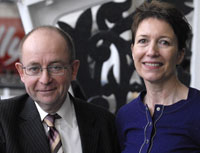
Proposals to integrate family courts body Cafcass into a new family justice service have sparked concern that guardians will miss out on the supervision and continuing professional development they need.
Under plans outlined by the Family Justice Review panel yesterday, Cafcass – which is currently based at the Department for Education – would be subsumed into a single service spearheaded by a family justice board and a chief executive and come under the Ministry of Justice.
The service would also incorporate other agencies, including the courts service, the Family Justice Council and local family justice boards.
Although Cafcass guardians would continue their role – to safeguard the interests of children and families involved in proceedings and provide welfare advice to the court – The College of Social Work has questioned how well this would work in practice.
In a statement it said: “The College is not satisfied that the Review has yet given sufficient thought to the implications of moving court social work to the Ministry of Justice. The College would seek reassurances that adequate protections were in place for the independence and professionalism of court social workers, including access to excellent supervision and professional development.”
A spokesperson pointed out that Cafcass would be sitting within a very different culture. “The MoJ doesn’t have a track record of supporting social workers and recognising their specific needs such critical reflection and CPD.”
Review chair David Norgrove told Community Care: “What we want to do in recommending that Cafcass moves into the family justice service and reports into the MoJ is to bring Cafcass closer to the judiciary, to make it clear that the social work functions Cafcass carries out are essential in supporting the court process.”
Under the proposals, Cafcass would continue to supervise and manage family court guardians, according to chief executive Anthony Douglas, from within the new family justice service. “For us, it’s business as usual. The assumption is that Cafcass practitioners’ work continues with, at some point, a change in the organisational arrangements. What matters is not the name but the functions,” he added.
“There are, in any proposed change like this, potential benefits and risks and we agree with both the College and the panel that it’s crucial that our court social work role is not diluted. But integration could also offer the chance for a more effective service in which there’s less delay and where there is the chance for case management to actually improve.”
There have also been suggestions from some sources that the move is part of wider efforts to push family justice up the political agenda.
Review chair David Norgrove said: “There has been a lack of priority. Criminal justice is so much bigger and for the last two decades it has had much more attention. Family justice has been neglected.”
What do you think? Join the debate on CareSpace
Keep up to date with the latest developments in social care. Sign up to our daily and weekly emails
Related articles
‘Shocking’ family justice system needs radical revamp
Cafcass faces shake-up but review rules out abolition
Family justice review chair David Norgrove: ‘we can’t go on like this’


 Bournemouth, Christchurch and Poole
Bournemouth, Christchurch and Poole  Hampshire County Council
Hampshire County Council  Lincolnshire County Council
Lincolnshire County Council  Norfolk County Council
Norfolk County Council  Northamptonshire Children’s Trust
Northamptonshire Children’s Trust  South Gloucestershire Council
South Gloucestershire Council  Wiltshire Council
Wiltshire Council  Wokingham Borough Council
Wokingham Borough Council  Children and young people with SEND are ‘valued and prioritised’ in Wiltshire, find inspectors
Children and young people with SEND are ‘valued and prioritised’ in Wiltshire, find inspectors  How specialist refugee teams benefit young people and social workers
How specialist refugee teams benefit young people and social workers  Podcast: returning to social work after becoming a first-time parent
Podcast: returning to social work after becoming a first-time parent  Podcast: would you work for an inadequate-rated service?
Podcast: would you work for an inadequate-rated service?  Family help: one local authority’s experience of the model
Family help: one local authority’s experience of the model  Workforce Insights – showcasing a selection of the sector’s top recruiters
Workforce Insights – showcasing a selection of the sector’s top recruiters 

 Facebook
Facebook X
X LinkedIn
LinkedIn Instagram
Instagram
Comments are closed.